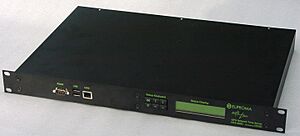Time server facts for kids
A time server is like a special computer that tells other computers the exact time. It gets the correct time from a very accurate source, like a super-precise clock or another time server. Then, it shares this time with all the devices connected to it on a computer network. Think of it as the official timekeeper for your network!
Time servers can be found in many places. Some are used inside a local network, like at a school or office. Others are internet time servers, which means they provide time to computers all over the world.
The most common way time servers share time is using something called the Network Time Protocol (NTP). This is a set of rules that computers use to talk to each other about time. There are other older ways, but NTP is the most popular today.
How do Time Servers Get the Right Time?
Time servers need a very accurate clock to get their time from. Some get it from another time server that is even more accurate. Others connect directly to special clocks. The most common and accurate sources are:
- GPS Clocks: These clocks use signals from GPS satellites orbiting Earth. GPS signals are incredibly precise, making them excellent for timekeeping.
- Atomic Clocks: These are the most accurate clocks ever made! They measure time using the vibrations of atoms. Time servers often connect to these for super-exact time.
Some time servers are regular computers with special software. For example, a computer that stores files can also become a time server if you add the right program. The NTP website offers free software that lets many types of computers act as time servers. Other time servers are special devices built just for telling time. These dedicated devices focus only on providing super accurate time.
What is a Stratum Level?
When we talk about time servers, you might hear the word "stratum." This word helps us understand how close a time server is to a very accurate, main time source. Imagine a ladder:
- Stratum 1 is at the top. These are the most accurate time servers. They usually connect directly to a GPS clock or an atomic clock. They are like the master timekeepers.
- Stratum 2 servers get their time from Stratum 1 servers.
- Stratum 3 servers get their time from Stratum 2 servers, and so on.
The stratum level goes from 1 to 15. A lower number means the server is closer to the original, super-accurate time source. Many computers prefer to get their time from servers with low stratum numbers because they are more reliable. If a time server has a very high stratum number, some computers might not trust its time. This is important for people who set up time servers in their own networks.
See also
 | Valerie Thomas |
 | Frederick McKinley Jones |
 | George Edward Alcorn Jr. |
 | Thomas Mensah |


